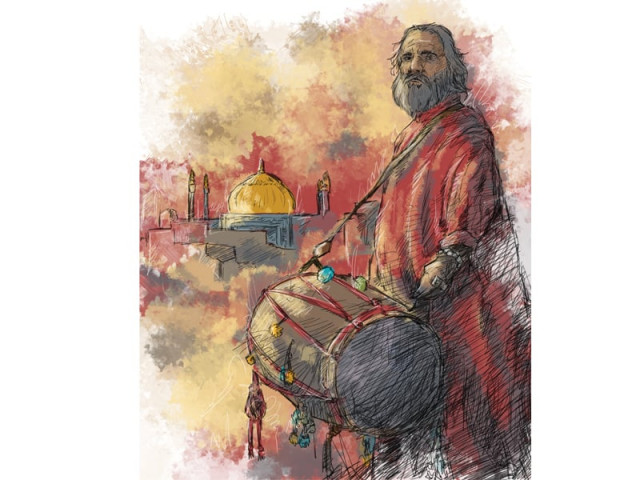Music to sore ears: Apart from cold winds, Quetta sends dhol players this way
Musicians from Quetta visit every year to entertain and enthral.

Every evening, after the sun sets, the drivers of oil tankers sing and dance to the rhythm of his dhol till midnight - in grief and in joy. Passers-by stop and watch the dancers spinning in euphoric circles and often mistake it for a wedding ceremony.
Hailing from Pishin near Quetta, 32-year-old Torjan - the dhol player - learnt his art as a child and for the past seven years, he comes with his friend, Asmatullah, to stay in Karachi during the winter.
The two spend most of their days in Shireen Jinnah Colony, among the drivers who dance to their music. Colourful lights and fancy sound effects may have replaced traditional drums in weddings but for some, the sound of Torjan's dhol is the ultimate musical experience.
Torjan's real name is Bor Muhammad but for Shireen Jinnah Colony, he will always be Torjan. Every Sunday, the sound of his dhol, along with the surna - a traditional Persian tubular woodwind instrument - attracts dozens to Sea View, Clifton.
"Our livelihood is connected to our art," said Torjan, who has been in Karachi for more than five months now. "We eat only when the sounds of our dhols and surnas echo through the streets. In winter, snowfall brings life to a standstill in Quetta. It is then, that we head to Karachi."
According to him, they make up to Rs2,000 a day and even occasionally perform at weddings. However, most of their days are spent playing the instruments on the Shireen Jinnah Colony road.
Asmatullah and Torjan can play many compositions on their instruments - from the fast tempos associated with songs of elation and joy to the slow melodies that one identifies with meloncholy. However, in Karachi, they are mostly asked to play Attan tempos - a popular Pashtun dance. "The drivers and conductors are from different tribal areas and each area has its own tempo, its own rhythm," said Torjan. "Personally, I like Sarkhi Attan - a type of dance in which dancers spin to the music - because I get caught up in the music also and start spinning along with the dancers. The more energy the dancers have, the harder I beat the dhol."
Shinkhalai Ustad is another dhol player who visits the city during winters. Ustad has spent most of his life among the people of Pishin in Quetta but has a soft spot for Karachi. "This city is a miniature Pakistan," he said. "Here, you find people from every ethnicity and even from every tribe. We not only earn money here but are also treated with respect. Every day here is like a wedding day for us - in Karachi, we don't rest, and neither do our instruments."
The drivers respect the musicians and keep them happy with gifts. "They are like our brothers," said Mehboob Ali, a truck-art painter in the colony. "They entertain us and help us unwind after a hard day's work."
During winters, the sound of these instruments can often be heard ringing through the night and rather than being disturbed by it, the residents appreciate it - finding comfort in the melody. "We often sit here, sipping tea, and watch the men dance," said Keamari resident Umer Khitab, who was watching from a tea hotel across the street. "I believe it is the only area in Karachi where the dhol plays every day."
An important purpose
However, there is more to the musicians than just entertainment. They have a role to play in protests. "We bring them especially from Quetta during our protests and they stay with us during that time," said a senior member of the oil tankers association, Shafeeq Kakar. "While the rest of Karachi burns in protest, we demonstrate through song and dance, and every time, we succeed in having our demands met without resorting to violence."
As the summer beckons, Ustad has left for Quetta but Torjan and Asmatullah intend to spend more time in Karachi, keeping the drivers entertained. And for a little while longer, the elation of the dhol will echo through the city.
Published in The Express Tribune, April 8th, 2014.



















COMMENTS
Comments are moderated and generally will be posted if they are on-topic and not abusive.
For more information, please see our Comments FAQ